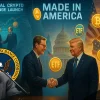A Politically Motivated Decision?
At the Token2049 event in Singapore on September 18, Arthur Hayes voiced his skepticism about the Federal Reserve’s recent decision to cut interest rates by 50 basis points. Hayes believes this move may not stem from genuine economic necessity but is instead a strategic effort by Fed Chair Jerome Powell and Treasury Secretary Janet Yellen to support the Democratic Party in the upcoming elections. “They want to juice financial markets to help Kamala Harris win,” Hayes remarked, suggesting that such actions prioritize political gain over economic stability.
Economic Indicators vs. Rate Cuts
Hayes highlighted a disconnect between the Fed’s decision and the current economic indicators, noting that the U.S. economy is exhibiting strong GDP growth and low unemployment. This raises questions about the rationale behind making borrowing cheaper. Hayes fears this could ultimately lead to increased inflation as the government may leverage lower borrowing costs to expand spending. “It’s calm before the storm,” he cautioned, anticipating that the full repercussions of the rate cut could disrupt both traditional and crypto markets soon.
Global Implications: The Yen and Bitcoin
Hayes also turned attention to international developments, particularly the Bank of Japan’s interest rate decisions, which he believes could further impact Bitcoin’s performance if the yen weakens. He pointed out that the narrowing interest rate differential between the U.S. and Japan could lead to a stronger yen, potentially triggering a market correction for risk assets. According to Hayes, “The initial reaction is going to be negative,” predicting that the Fed may need to cut rates further to stabilize the economy.
The Future of Central Banks and Crypto Markets
In a broader context, Hayes suggested that we may be witnessing the end of the central banking era, as politicians begin to exert more control over monetary policy. He believes that targeted liquidity creation will replace traditional central bank functions, presenting an opportunity for cryptocurrencies to thrive as a globally portable asset. “Crypto is the only asset that you can own that’s globally portable and gets you out of that system,” he asserted.
Conclusion
As the implications of the Fed’s rate cut unfold, both traditional and crypto markets are bracing for potential volatility. Hayes’ insights underscore a critical intersection of politics, economics, and the evolving landscape of digital currencies, hinting at significant shifts ahead.

































